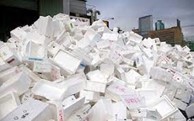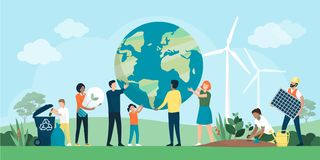Korea enjoys a fantastic delivery infrastructure. Virtually any product or service is available online and delivered to your door at a speed that is unbeatable. This is the home of the haste-based ‘빨리빨리’ (pronounced ‘bballi-bballi’ and meaning ‘quickly, quickly’) culture, after all. Anything from complex electronics to a cup of bubble tea can be had with only a few digital moments on your smartphone or computer. Delivery drivers in trucks, vans and on motorcycles (known as “QuickService”) crisscross the nation to get your goods to your door as soon as possible. Avoiding crowded shops during the pandemic saw delivery demand grow with even more businesses adding this service. And never are deliveries busier than in the weeks before Korea’s two main gift-giving holidays, Chuseok (Korean Thanksgiving) and Lunar New Year.
The unfortunate downside to quick delivery is the amount of waste that it generates. Protecting products as they are hauled from storage to transport to front door, bouncing over speedbumps along the way, is a headache for vendors. Korean customers have high expectations and won’t hesitate to return a product that arrives in less than pristine condition.

In response, most deliveries are wrapped in multiple layers of packaging, which generates waste far beyond the size of the item being delivered. This year, the customary Chuseok gifts delivered to our office alone generated a Styrofoam mountain surrounded by an avalanche of bubble wrap, not to mention the cardboard boxes and plastic bags in which they were delivered. The large amount of insulating material included with chilled items is particularly difficult to reuse (as compared with plastic bags), adding to its financial and environmental cost.
Overall, Korea has an excellent recycling regime. Households must divide their waste into plastics, cans, bottles, paper, and food, depositing each in designated containers provided at every residential complex. Disposal of recyclables is free. For all non-recyclable waste, there is a volume-based waste disposal fee. Larger ‘hard waste,’ such as broken appliances or furniture, is also recycled and an e-waste regime has been implemented to recycle electronics. Disposal of construction waste is also regulated.
The combination of free disposal of recyclable waste with the ‘pay-as-you-throw’ system for regular waste has resulted in very high recycling participation. Officials boast a recycling rate in excess of 65%. (As an avowed skeptic, I wonder if the carefully sorted recyclable waste goes to the same landfill or incinerator as regular garbage, but on paper, compliance is high.) Furthermore, the government claims that Korea reduced its waste per capita by approximately 20% in 1995, the first year of the volume-based waste disposal scheme, and that waste levels remain about 16% lower than the ‘base case’ estimates.
Plastic remains the biggest problem, both for collecting and recycling. The government has banned plastic shopping bags in grocery stores and implemented an excise tax on bags in other stores. Similar programs have been implemented to help reduce the approximate 1 kg per day of waste generated by each Korean resident. Looking at my own household waste, the vast majority is plastic packaging and there is no bigger source than the things delivered to my door. While gift-giving is an important part of Korean culture, and fast, cheap, and nationwide delivery an attractive feature of living in this country, waste reduction goals could be more easily achieved if an environmentally friendly solution to the packaging problem could be implemented. This would require support from all stakeholders in the supply chain, from producer to deliverer to consumer.

Producers could adopt more environmentally friendly packaging materials. Corporate Social Responsibility should be internalized at the corporate level into a change of mindset where firms consider the environmental impact from sourcing through to product delivery. Samsung Electronics demonstrated ESG before the concept came into vogue. They replaced Styrofoam with molded shapes made from recycled paper more than a decade ago. Now internet shopping giant Coupang delivers its groceries in durable insulated and branded “FreshBag” cases, that, once emptied by the customer, are picked up by the next delivery driver in the area to be reused.
At present just a fraction of deliveries and service providers utilize conscious waste reduction practices. It is up to consumers to challenge businesses. When ordering Chuseok and Lunar New Year gifts, individuals and organizations can select items based on environmental impact and recyclable packaging. Online reviews could make note of this factor. In Korea’s highly digitalized culture, netizens have tremendous influence; a groundswell of consumer objection would be heard immediately.
Excess waste generation – plastic or otherwise - is a global problem. Recycling is only part of the solution. In Korea, as in every country, each one of us can make a difference by taking responsibility for reducing packaging waste. We must act now and quickly – 빨리 빨리! - or be smothered in our own waste.
IRC has been assisting international organizations to identify and capitalize on opportunities in Korea for four decades. With its modernization into a world-class economy, we have seen rapid growth in the country’s concern toward environmentally-friendly innovations and solutions, from smart city technologies to consumer oriented products. If you have a waste management solution or are seeking to tap one of the innovative technologies Korean firms have developed, let IRC guide your way!

|